
The Right-believing Prince Daniel was the fourth son of the ever-memorable Great Prince Saint Alexander Yaroslavich Nevsky. He was the last among his brothers, as was also his great-grandfather Great Prince Vsevolod Yurevich. Thus, Princes Daniel and Vsevolod were likened by the Lord unto the ancient king, ancestor of God, and Prophet, David, who also was the youngest of his brothers.
This blessed Prince Daniel was left without parents two years from birth, but from his childhood the Lord preserved him. The Lord chose him, prospered and established him. No one went to war against him, but the God-preserved dominion of the pre-eminent city of Moscow was obtained by him as an inheritance. God loved and glorified Prince Daniel and his righteous posterity and permitted them to reign for centuries. If at that time the Moscow dominion was not so extensive as afterwards, nevertheless, then the blessed and Great Prince Daniel was invincible. When among the brethren of Prince Daniel and their relatives there occurred civil strife near his dominions, he, clever and courageous, always sought to appear as a zealot of humble-mindedness. Valiantly arming himself against those at enmity with him, he went out against them with his hosts, but he appeased the rancor without the shedding of blood.
17.02.2023Read more

Original text of this homily was formed as a result of integrating 3rd and 4th homilies of the "Commentary on the Gospel of Luke" (PG 77, 1039-1050) – Ed.
[Sermons 3 on Luke 2:21-24]
Very numerous indeed is the assembly, and earnest the hearer: – for we see the Church full: – but the teacher is but poor. He nevertheless Who giveth to man a mouth and tongue, will further supply us with good ideas. For He somewhere says Himself, "Open thy mouth wide, and I will fill it." Since therefore ye have all come together eagerly on the occasion of this joyous festival of our Lord, let us with cheerful torches brightly celebrate the feast, and apply ourselves to the consideration of what was divinely fulfilled, as it were, this day, gathering for ourselves from every quarter whatsoever may confirm us in faith and piety.
15.02.2023Read more

Tthe Holy Church, which rejects the impious worship of angels devised by idolaters and heretics of old, has received from the divinely inspired Fathers the tradition of celebrating with reverence the Synaxis of the Holy Angels. In the days of the Old Testament, the people of God, having fallen away from their Creator, began to worship that which the Lord created. They made idols after the likeness of things visible, of that which is in heaven above and earth beneath, the work of their own hands. At that time, when the people offered oblations unto the sun, the moon, and the stars as gods, imagining that these possessed living souls, they also began to worship angels. The Book of Kings makes mention of this, saying that they "burned incense unto Baal, to the sun, and to the moon, and to the twelve signs of the Zodiac, and to all the host of heaven," that is, to the angels; for the host of heaven is comprised of the angels, as is said in the Gospel: "And suddenly there was with the angel a multitude of the heavenly host."
21.11.2022Read more

If any man will come after me, let him deny himself, and take up his cross and follow me. (Matt. 16:24)
The best known of the Orthodox saints of modern times, St. Seraphim of Sarov, has much to teach the Orthodox Christians of these last times. Unfortunately, the striking nature of some of his spiritual experiences – which indeed stand in glaring contrast to the ordinary Christian experience of our days – has led some to miss the whole point of his teaching.
St. Seraphim was born in 1759 in Kursk, in the heart of Holy Russia, to a pious merchant family. Raised in the fear of God and strict Orthodox life, he also knew very early the mercies of God at first hand; at the age of ten he was miraculously healed of a serious affliction by the Mother of God through her Kursk Icon (which now is in America and continues to work miracles).
Through the reading of Scripture and other basic Christian literature, a deep desire for spiritual things was kindled in him and he began to long to serve God in the monastic calling.
Upon the counsel of the holy recluse Dositheus of Kiev, he went to Sarov Monastery where, at the age of 27, he was tonsured a monk. By a life of constant prayer and unceasing spiritual warfare, he drew upon himself God’s grace and was granted the gifts of prophecy, discernment and healing. Thousands flocked to him for counsel and hegreeted all who came to him with the words “Christ is Risen!” No one who came to him left without consolation and an answer to his spiritual need. More than once he was seen in uncreated light, shining more brightly than the sun.
01.08.2022Read more
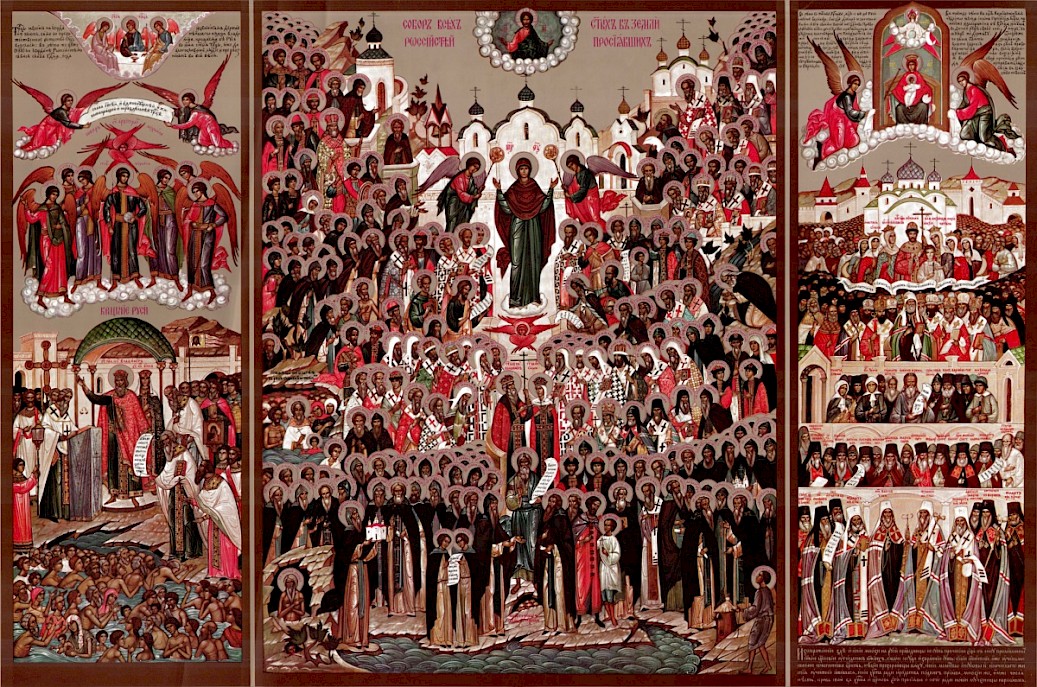
The Orthodox Church lovingly beholds the saints of God, who shone forth in faith in and love for God, patterning their lives on the Gospel. It is rare for a week to go by when divine service is not held in our church in honor of some saint. In those churches where services are celebrated daily, there are saints that are commemorated every day. Songs of praise for them are lifted year round. We do not hear the entire life histories of each saint in church, but in the troparia and kontakia that are sung, we learn in brief outlines of the image of the saint, his or her works and spiritual beauty. The soul of a saint, invisibly present wherever he is remembered with love, arouses in our hearts feelings of faith and love.
The saints are no strangers to us. For we are all of one Christian family! Of course, they do not live in our homes, we do not see them directly: but let us be bound with them in love! Love overcomes time and space.
Parents — especially mothers — know that a child does not need to be within one’s range of sight at all times in order for us to love them. In fact, whoever may not be at home with us, is more desired and missed. That is the nature of our love for the saints. We love them, even though they lived long ago, and we know them only through words. Our common love for Christ is shared with them, it relates us, unites us within one family.
26.06.2022Read more

The Father, the Son and the Holy Spirit share one nature, one essence, one substance. That is why the Three Faces are the Trinity, one-in-substance. Humans also have one nature, one substance.
But while God is the Indivisible Trinity, divisions occur in mankind constantly... The Father, the Son and the Holy Spirit have common thought, common will, common actions. What the Father desires, the Son also desires, and the Holy Spirit also desires. Whatever the Son loves, so do the Father and the Holy Spirit also love. Whatever is pleasing to the Holy Spirit, is pleasing to the Father and Son. Their actions are also common among them, all act in conjunction and in accord.
12.06.2022Read more
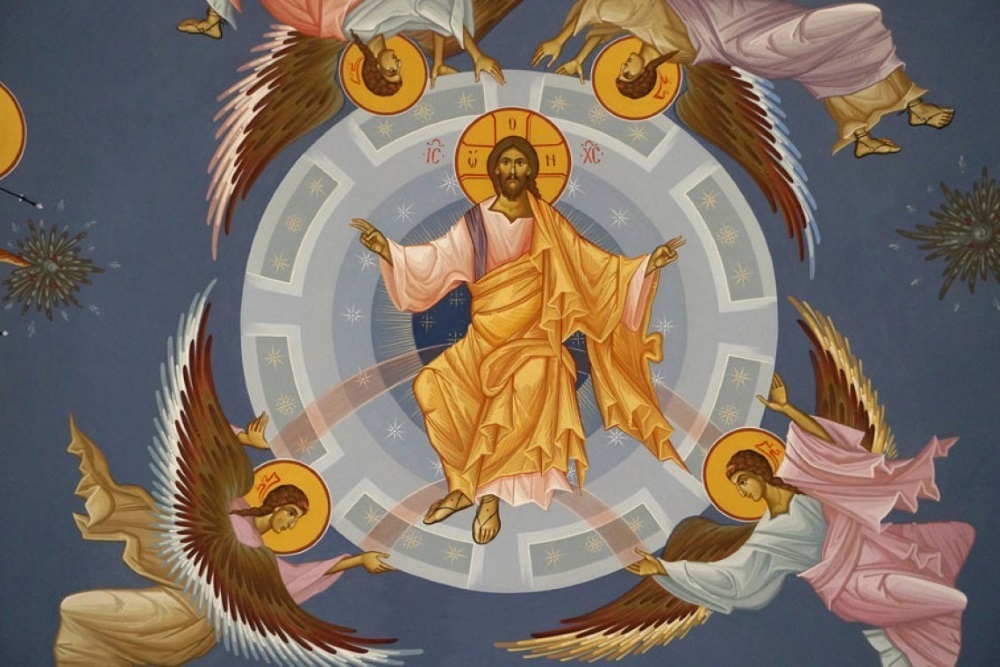
1. The Jews kept the Feast of the Passover, the crossing from Egypt to the land of Palestine, as laid down in their law, and we have celebrated the gospel Pascha, the passage of our human nature in Christ from death to life (cf. JN. 5:24; I JN. 3:14), from corruption to incorruption (cf. I COR. 15:42, 50). What words can express the superiority of this celebration over the solemnities of the old law and the events commemorated on its holy days? No one can adequately state how much more excellent it is. The enhypostatic Wisdom of the most high Father, God's pre-eternal Word who is beyond all being, who was united with us in His love for mankind and lived among us (JN. 1:14), has now revealed through His actions a cause for celebration even more distinctly superior than Pascha's excellence. For we now celebrate the transition of our nature in Him, not just from the subterranean regions up on to the earth, but from the earth to the heaven of heavens, and to the throne above the heavens of Him who rules over all.
2. Today the Lord not only stood with His disciples after His resurrection, but was also parted from them and was taken up into heaven as they watched (Acts 1.9-11), ascended and entered into the true Holy of Holies and sat down on the right hand of the Father, far above all principality and power and every name and honor that is known and named, either in this world, or in that which is to come (cf. Eph. 1.20-21). There were many resurrections before Christ’s resurrection, and similarly, there were many ascensions before His ascension. The Spirit lifted up Jeremiah the prophet, and an angel took up Habakkuk (Bel & Dr. 33-39 LXX). In particular it is written that Elijah went up with a chariot of fire (2 Kgs. 2.11). But even he did not go beyond the realms of earth, and the ascension of each of those mentioned was just a sort of movement lifting them up from the ground without taking them out of the area surrounding the earth. Similarly, the others who were resurrected all died and returned to the earth. By contrast, Christ has risen and death no longer has dominion over Him (cf. Rom. 6.9), and now He has ascended and sat down on high, every height is below Him and bears witness that He is God over all (Rom. 9.5).
02.06.2022Read more
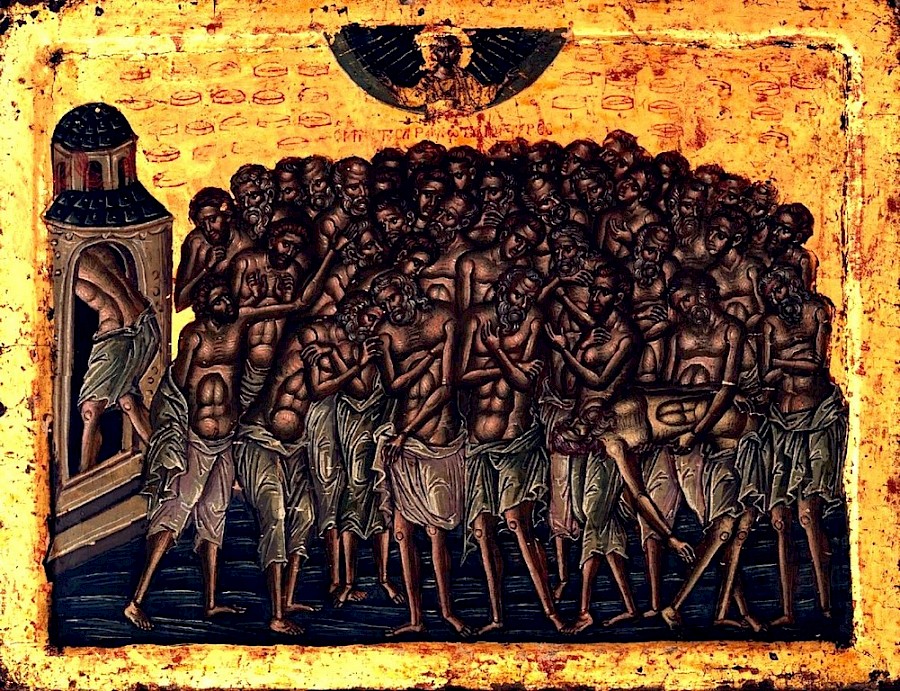
The Testament of the Forty Holy and Glorious Martyrs of Christ who died at Sebaste [1].
Meletius, Aetius, and Eutychius, prisoners of Christ, send greetings in Christ to the holy bishops and presbyters in every city and country, to the deacons and confessors and to all others who pertain to the Christian Church.
1. When by God’s grace and the common prayers of all we accomplish the contest set before us, and hasten to the prize of our heavenly calling[2], then this is the determination we wish made with regard to the collection of our remains by the friends of our father, the presbyter Proidus, and our brothers Crispinus and Gordius, with all their zealous community, and Cyril, Mark, and Sapricius son of Ammonius, so that our bones may be laid to rest in the town of Sarim below the city of Zelon[2]. For, though we come from different localities, we have none the less decided that we should have one and the same place of rest. We endured the same contest: and therefore we have decided to have a common resting-place at the spot we have mentioned. This was a determination of the Holy Spirit, and it was pleasing to us as well.
22.03.2022Read more
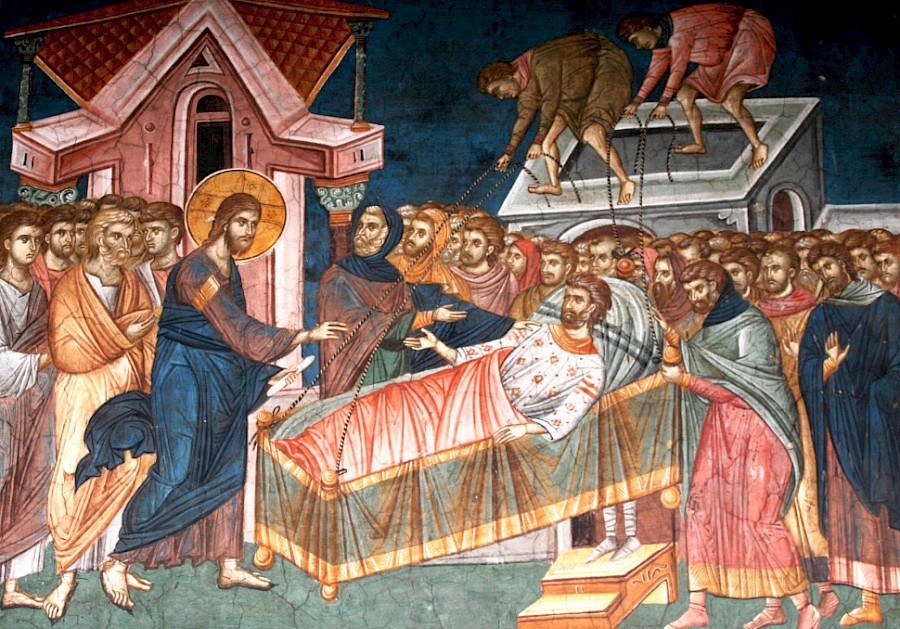
I shall introduce my homily to your charity today with the Lord’s own words, the quintessence, in fact, of the Gospel preaching: “Repent: for the kingdom of heaven is at hand” (Matt. 4:17; cf. 3:2 and Mark 1:15). Not only is it at hand, but it is in us, for the Lord also says, “The kingdom of heaven is within you” (Luke 17:21). Nor is it merely within you, for before long it will come more openly to abolish every principality, power and might (cf Eph. 1:21), and to grant invincible strength, inexhaustible riches and unchanging, incorruptible and unending enjoyment, glory and might solely to those who live according to God’s will and have passed their time here in a way that pleases Him.
2. Since the kingdom of God is at hand and within us and will soon arrive, let us make ourselves worthy of it by works of repentance. Let us exercise force on ourselves, driving away evil prejudices and habits. For "the kingdom of heaven suffers violence, and the violent take it by force" (Matt. 11:12). We should emulate the patience, humility and faith of our God-bearing Fathers. “Whose faith follow”, it says, “considering the end of their manner of life” (Heb. 13:7). Let us mortify those parts of us which belong to the earth: fornication, impurity, evil passion and covetousness, especially during these holy days of the fast. This is why the grace of the Spirit taught us first about God’s terrible Judgment which is to come, then reminded us of Adam’s exile, and afterwards pointed out to us the faith that is surest of all. For fear of the Judgment and in grief at the exile, we should hold fast to the faith, humble ourselves and neither yield to self-indulgence, nor open the door to all the passions and make room for them by means of our unbelieving, insatiable stomachs. This would mean following the wide and easy way, destroying ourselves with pleasure. Since we love the strait and narrow way which leads to life, and fasting is its starting point and first furlong, let us vigorously make our way through these forty days of fasting.
20.03.2022Read more
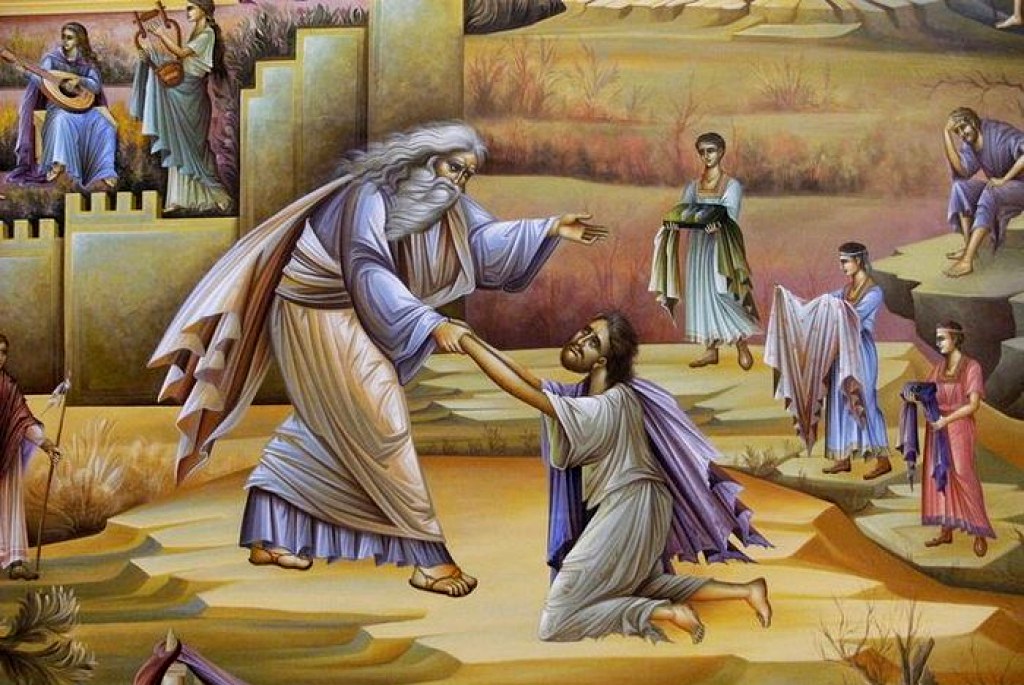
I will arise and go to my father (Luke 15:18)
Brethren! All our attention must be centered on the parable of the Prodigal Son. We all see ourselves in it as in a mirror. In a few words the Lord, the knower of hearts, has shown in the person of one man how the deceptive sweetness of sin separates us from the truly sweet life according to God. He knows how the burden of sin on the soul and body, experienced by us, impels us by the action of divine grace to return, and how it actually does turn many again to God, to a virtuous life. We will repeat it and discuss how necessary and easy it is for a sinner to return to God.
One man had two sons. When they came of age, the younger one said to the father, “Give me my rightful share of the estate.” And the father divided the property. The elder son did not take his portion and remained with the father, a sign that he loved his father with a pure heart, and he found satisfaction in fulfilling his will (neither transgressed I at any time thy commandment), and to depart from him he considered madness. But the younger, in a few days, having gathered all his property, left his father’s house for a distant country where he wasted all his substance, living dissolutely. From all this it is evident that he did not have a good and pure heart, that he was not sincerely disposed towards his good father, that he was burdened by his supervision and he dreamed it better to live according to the will of his own depraved heart. But let us hear what happened to him in exile from his father’s house. When he had spent everything in the foreign country in a disorderly manner, a great famine came upon that country and he began to be in need. He went and joined himself to one of the citizens of that country, and he sent him into his fields to feed swine. And he would have been happy to fill his stomach with the food (acorns and chaff) that the swine ate; but no one gave him any. Having come to his senses, he said, “How many hired servants of my father have bread enough and to spare, and I perish with hunger. I will arise and go to my father and I will say unto him: Father! I have sinned against heaven and before thee, and am no more worthy to be called thy son. Receive me as one of thy hired servants.” He arose and went to his father. When he was still afar off, his father saw him and had compassion on him and went to meet him. He embraced him and kissed him. He forgave him and led him to his house, dressed him in the finest clothes and made a feast in honor of his return. And so the lost son entered again into the love of his father.
20.02.2022Read more










